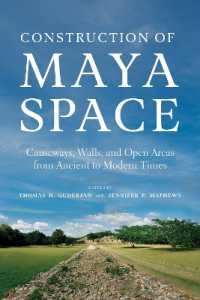- ホーム
- > 洋書
- > 英文書
- > Religion / Ethics
Full Description
In recent decades, powerful telescopes have enabled astrophysicists to uncover startling new worlds and solar systems. An epochal moment came in 1995, when a planet - 51 Pegasi b - was located orbiting a star other than our own sun. Since then, thousands of new planets have followed, and the question of life beyond earth has become one of the principal topics in discussions between science and religion. Attention to this topic has a long history in Christian theology, but has rarely been pursued at any depth. Writing with both passion and precision, Andrew Davison brings his extensive knowledge of Christian thought to bear, drawing particularly on the thought of Thomas Aquinas, as well as his training as a scientist. No book to date better prepares the Christian community for responding to evidence of other life, if it is found. And yet, we do not need to wait for that to have happened before this book shows its worth. In thinking about planets, creatures, and ecosystems beyond our planet, Davison already reinvigorates our theology for the earth.
Contents
Introduction; Part I. Creation: 1. Many worlds; 2. Angels; 3. Life; 4. Emptiness and plenitude; Part II. Revelation and Theological Knowledge: 5. Revelation; 6. Knowledge of God and the language of the trinity; Part III. Imago Dei and Uniqueness: 7. A Copernican demotion? 8. Uniqueness and sharing the imago dei; 9. Uniqueness, convergence and embodied cognition; Part IV. Christology, Salvation and Grace: 10. Sin and fall; 11. Responses to sin: one incarnation; 12. Multiple incarnations: introduction; 13. Distinct incarnations: possibility and christological detail; 14. The word unchanging and unchanged; 15. Person assuming and natures assumed; 16. Multiple incarnations: necessity and suitability; 17. The dealings of God with unfallen creatures; Part V. Eschatology: 18. The final state; 19. The arrival of the end.
-

- 電子書籍
- ドラゴンを手懐ける方法【タテヨミ】第1…
-

- 電子書籍
- 甦!戦馬大戦29【タテヨミ】






